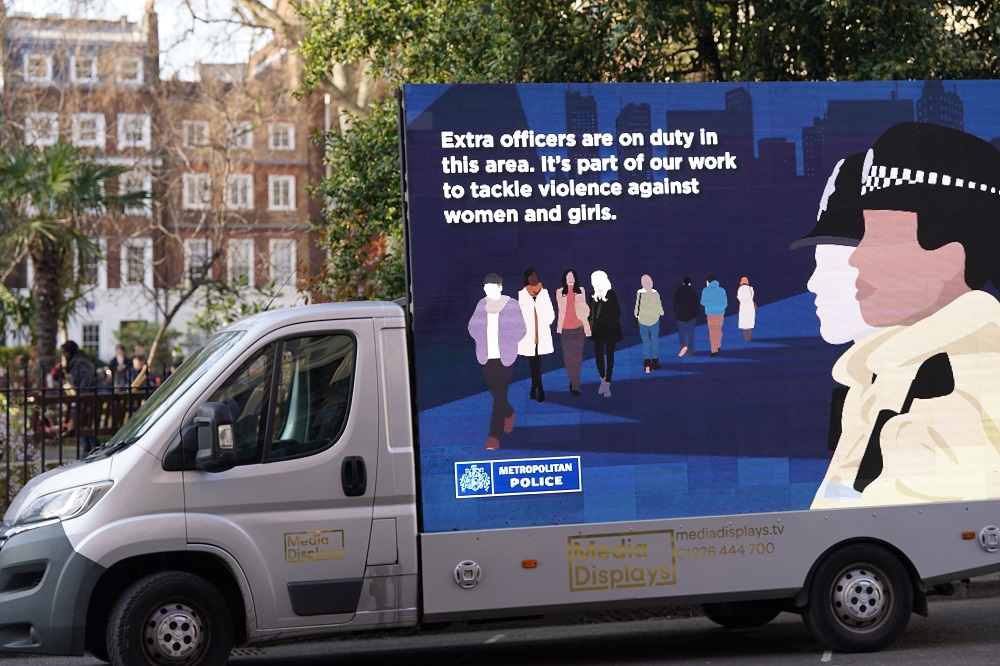Will criminalising public sexual harassment work and can women trust the police?

Sian Lewis – Lecturer in Criminology, University of Plymouth
The horrifying murders of Sarah Everard, Sabina Nessa, Bobbi-Anne McLeod, Bibaa Henry and Nicole Smallman were each reminders of the worst case scenario women fear when experiencing unwanted attention from men in public.
Now, the UK government has opened a consultation asking whether public sexual harassment should be a distinct criminal offence.
A recent survey found that 71% of women of all ages in the UK have experienced some form of sexual harassment in a public space.
Women spend vast amounts of energy trying to avoid and negotiate intrusions like catcalling, following, flashing and groping. These incidents too often make women feel vulnerable and in danger.
Another 2022 survey by the Office of National Statistics drew attention to the levels of fear (of sexual violence) women experience when moving through public space, particularly after dark.
Despite their prevalence and harm caused, incidents of public sexual harassment are largely underreported and rarely punished in the criminal justice system.
This is why the government has opened its consultation, which asks: Should there be a specific criminal offence of public sexual harassment, and what form should any such offence take?
Normalised
The government’s view is that behaviour amounting to public sexual harassment is already covered by existing criminal offences. These include the Criminal Justice Act 1988, the Public Order Act 1986, the Protection from Harassment Act 1997 and the Sexual Offences Act 2003.
Between them, these acts cover groping and other forms of sexual assault, exposure, unwanted non-sexual physical contact, threats and verbal abuse, behaviour causing repeated alarm, fear or distress and repeatedly putting someone under fear of violence.
But these existing laws are not so effective.
Research, including my own on sexual harassment on public transport, reveals several reasons that the majority of incidents do not even make it into the criminal justice system.
For many women, these experiences are so frequent that they become normalised. Some women do not know where or how to report.
Others worry that an incident isn’t “serious” enough to report, or don’t trust that the criminal justice system will handle it effectively.
Motivation
Arguably, a criminal offence specifically naming public sexual harassment could solve some of these issues.
It would demonstrate that the police have to take these experiences seriously and provide clarity on what incidents are “worth” reporting.
The government is suggesting two possible models for this legislation. The first would be to create a new offence which would apply “when a person commits an offence under section 4A of the Public Order Act 1986 and does so because of the complainant’s sex”.
Having committed the offence because of the victim’s sex would mean that the defendant could receive a longer sentence than if that had not been their motivation.
The other option builds on this but adds an additional element.
It includes a list of types of threatening, abusive, insulting or disorderly behaviour which might in particular circumstances be carried out because of a person’s sex.
How do other countries handle it?
If the UK government were to make public sexual harassment a criminal act, it would be in line with a growing number of countries.
In Peru, street sexual harassment (including catcalling, whistles and exhibitionism) has been a crime since 2014 and is punishable by up to 12 years in prison.
In Belgium, also since 2014, the law states that it is illegal to sexually harass or intimidate a person in public based on gender. Such behaviour is punishable by a fine or a prison sentence of up to one year.
More recently, in 2018 France introduced a law against public sexist behaviour and permits officers to charge fines on the spot.
In the first year of the legislation being introduced, almost 450 fines were given for catcalling, degrading comments and unwanted sexual attention.
It was widely hailed by women and politicians as a positive step in taking sexual harassment seriously.
The problem of increased police powers
The UK government’s consultation alone is a long overdue recognition of the harms of public sexual harassment. However, it also poses difficult questions around the current climate of policing gender-based violence.
Sarah Everard was murdered by a Met police officer, and the police were found to have breached the rights of protesters at a vigil in her memory.
And now, “grossly offensive” messages in a WhatsApp group with Couzens and several other officers are the subject of a criminal case.
Two Met police officers have also been jailed for taking photos of murdered sisters Bibaa Henry and Nicole Smallman and sharing them on WhatsApp.
Incidents like these have dramatically fractured women’s trust in the police, echoing the longstanding mistrust held by many marginalised (and overpoliced) communities.
Despite former Met commissioner Cressida Dick’s comments about “occasional bad ‘uns”, recent events show police culture remains rife with misogyny and racism.
If officers themselves are perpetrating sexist behaviour and gender-based violence, how can women be expected to trust the criminal justice system to protect them?
The government must proceed with caution if it seeks to combat public sexual harassment through an increase in state power, and not turn a blind eye to how this power continues to be abused.
This article was first published in The Conversation![]()
Support our Nation today
For the price of a cup of coffee a month you can help us create an independent, not-for-profit, national news service for the people of Wales, by the people of Wales.






One of the reasons for this sort of behaviour is lack of discipline. Parents and teachers rarely discipline the children and they grow up to be hooligans. I wouldn’t advocate corporal punishment but there has to be a way of conveying to these miscreants that there are things you can do and things which are prohibited.
Well one would hope this would have been covered in the first interview in Hendon…